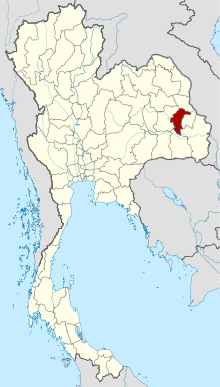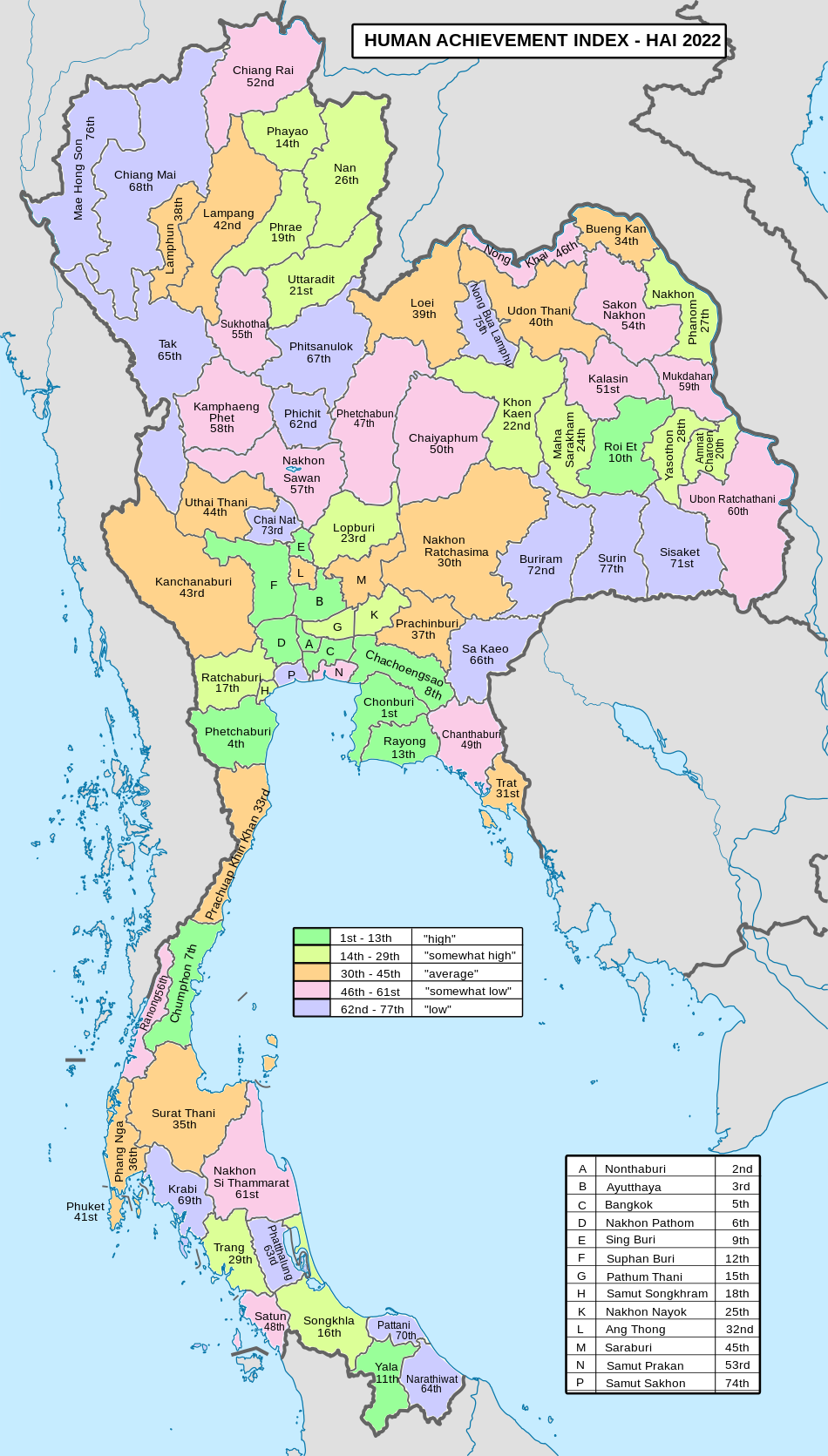Yasothon province
Yasothon
ยโสธร | |
|---|---|
From left to right, top to bottom : Naga building at Vimarn Phaya Thean, Phra That Kuchan, Wat Maha That, St Michael's Church, Songyae, Phra That Kong Khao Noi, Rocket Festival | |
| Nickname: Mueang Yot | |
| Motto(s): เมืองบั้งไฟโก้ แตงโมหวาน หมอนขวานผ้าขิด แหล่งผลิตข้าวหอมมะลิ ("Home of the amazing Bang Fai. Sweet watermelons. The mon khit pillows. Production source of white rice.") | |
 Map of Thailand highlighting Yasothon province | |
| Country | Thailand |
| Capital | Yasothon |
| Government | |
| • Governor | Chonlatee Yangtrong (since October 2020)[1] |
| Area | |
• Total | 4,131 km2 (1,595 sq mi) |
| • Rank | Ranked 52nd |
| Population (2019)[3] | |
• Total | 537,299 |
| • Rank | Ranked 48th |
| • Density | 130/km2 (300/sq mi) |
| • Rank | Ranked 34th |
| Human Achievement Index | |
| • HAI (2022) | 0.6485 "somewhat high" Ranked 28th |
| GDP | |
| • Total | baht 26 billion (US$0.9 billion) (2019) |
| Time zone | UTC+7 (ICT) |
| Postal code | 35xxx |
| Calling code | 045 |
| ISO 3166 code | TH-35 |
| Website | www |
Yasothon province (Thai: ยโสธร, pronounced [já.sǒː.tʰɔ̄ːn]), one of Thailand's seventy-six provinces (changwat), lies in central northeastern Thailand also called Isan. The province was established by the revolutionary council of Field Marshal Thanom Kittikachorn, after its Announcement No. 70 which came into force on 3 March 1972.
Neighboring provinces are (from north clockwise) Mukdahan, Amnat Charoen, Ubon Ratchathani, Sisaket, and Roi Et.
Geography
[edit]The northern half of the province consists of plains with low hills; the southern part consists of the river lowlands of the River Chi, with ponds and swamps. Yasothon's total forested area is 358 km2 (138 sq mi) or 8.7% of the province.[2]
Geology
[edit]Yasothon soils (rhodic ferralsols) formed in the Triassic before the uplift of the Khorat Plateau, are relict soils made fertile by field termites through bioturbation.[6]
National park
[edit]There is one national park, along with five other national parks, make up region 9 (Ubon Ratchathani) of Thailand's protected areas.
- Phu Sa Dok Bua National Park, 231 km2 (89 sq mi)[7]: 75
History
[edit]The province was created on 1 March 1972, when it was split off from Ubon Ratchathani.
Symbols
[edit]The seal of the province shows two mythical lions, called singh, facing the chedi Prathat Anon, in the temple Wat Maha That in the city of Yasothon. In the legendary account of the founding of the city, a lion came out of the forest when the site was chosen; hence the city was called Ban Singh Tha (Thai: บ้านสิงห์ท่า), Home (of) Imposing Lion. At the bottom of the seal is a lotus flower (Nymphaea lotus), as the lotus is both the provincial flower of the province and of Ubon Ratchathani province, of which Yasothon was part until 1972.[8] The provincial tree is Anisoptera costata. The provincial aquatic life is the sheatfish Ompok bimaculatus.
Administrative divisions
[edit]
Provincial government
[edit]The province is divided into nine districts (amphoe). The districts are further subdivided into 78 subdistricts (tambon) and 885 villages (muban).
Local government
[edit]As of 26 November 2019 there are:[9] one Yasothon Provincial Administration Organisation (ongkan borihan suan changwat) and 24 municipal (thesaban) areas in the province. Yasothon has town (thesaban mueang) status.[10] Further 23 subdistrict municipalities (thesaban tambon). The non-municipal areas are administered by 63 Subdistrict Administrative Organisations - SAO (ongkan borihan suan tambon).[3]
Transport
[edit]
Yasothon city is about 500 km (310 mi) from Bangkok at the intersection of Routes 23 and 202, and the south end of Route 2169. Several bus lines connect the province at frequent intervals to Bangkok's Northern Bus Terminal (Thai: หมอชิดใหม่, RTGS: mo chit mai), as well as all bus terminals in the north and northeast. Ubon Ratchathani province is 100 kilometres east on Route 23.
Human achievement index 2022
[edit]| Health | Education | Employment | Income |
| 50 | 6 | 44 | 54 |
| Housing | Family | Transport | Participation |

|
 |

|
|
| 13 | 36 | 36 | 38 |
| Yasothon, with an HAI 2022 value of 0.6485 is "somewhat high", occupies place 28 in the ranking. | |||
Since 2003, the United Nations Development Programme (UNDP) in Thailand has tracked progress on human development at the provincial level using the Human Achievement Index (HAI), a composite index covering eight key areas of human development. The National Economic and Social Development Board (NESDB) has taken over this task since 2017.[4]
| Rank | Classification |
| 1 - 13 | "high" |
| 14 - 29 | "somewhat high" |
| 30 - 45 | "average" |
| 46 - 61 | "somewhat low" |
| 62 - 77 | "low" |
| Map with provinces and HAI 2022 rankings |

|
References
[edit]- ^ "ประกาศสำนักนายกรัฐมนตรี เรื่อง แต่งตั้งข้าราชการพลเรือนสามัญ" [Announcement of the Prime Minister's Office regarding the appointment of civil servants] (PDF). Royal Thai Government Gazette. 137 (Special 238 Ngor). 20. 9 October 2020. Archived from the original (PDF) on April 13, 2021. Retrieved 13 April 2021.
- ^ a b "ตารางที่ 2 พี้นที่ป่าไม้ แยกรายจังหวัด พ.ศ.2562" [Table 2 Forest area Separate province year 2019]. Royal Forest Department (in Thai). 2019. Retrieved 6 April 2021, information, Forest statistics Year 2019, Thailand boundary from Department of Provincial Administration in 2013
{{cite web}}: CS1 maint: postscript (link) - ^ a b รายงานสถิติจำนวนประชากรและบ้านประจำปี พ.ส.2562 [Statistics, population and house statistics for the year 2019]. Registration Office Department of the Interior, Ministry of the Interior. stat.bora.dopa.go.th (in Thai). 31 December 2019. Archived from the original on 14 June 2019. Retrieved 26 February 2020.
- ^ a b "ข้อมูลสถิติดัชนีความก้าวหน้าของคน ปี 2565 (PDF)" [Human Achievement Index Databook year 2022 (PDF)]. Office of the National Economic and Social Development Council (NESDC) (in Thai). Retrieved 12 March 2024, page 59
{{cite web}}: CS1 maint: postscript (link) - ^ "Gross Regional and Provincial Product, 2019 Edition". <>. Office of the National Economic and Social Development Council (NESDC). July 2019. ISSN 1686-0799. Archived from the original on 25 November 2023. Retrieved 22 January 2020.
- ^ Lofjle & Kubiniok, Landform development and bioturbation on the Khorat plateau, Northeast Thailand, Nat.Hist.Bull.Siam Soc. (56), 1996 [1] Archived 2011-07-21 at the Wayback Machine[not specific enough to verify]
- ^ "ข้อมูลพื้นที่อุทยานแห่งชาติ ที่ประกาศในราชกิจจานุบกษา 133 แห่ง" [National Park Area Information published in the 133 Government Gazettes]. Department of National Parks, Wildlife and Plant Conservation (in Thai). December 2020. Archived from the original on 3 November 2022. Retrieved 1 November 2022.
- ^ "Yasothon". Thailex. Retrieved 12 May 2021.
- ^ "Number of local government organizations by province". dla.go.th. Department of Local Administration (DLA). 26 November 2019. Retrieved 10 December 2019.
46 Yasothon: 1 PAO, 1 Town mun., 23 Subdistrict mun., 63 SAO.
- ^ "พระราชกฤษฎีกา เปลียนแปลงฐานะเทศบาลตำบลยโสธรเป็นเทศบาลเมืองยโสธร พ.ศ.๒๕๓๗" [Royal Decree Re: Change the status of Yasothon Subdistrict Municipality to Yasothon Town Municipality B.E.2537 (1994)] (PDF). Royal Thai Government Gazette. 111 (52 Kor): 46–47. 23 November 1994. Archived from the original (PDF) on June 9, 2012. Retrieved 10 December 2019.
External links
[edit] Yasothon travel guide from Wikivoyage
Yasothon travel guide from Wikivoyage- Provincial page from the Tourist Authority of Thailand
- Website of province(Thai) Archived 2005-10-01 at the Wayback Machine









